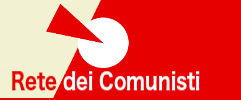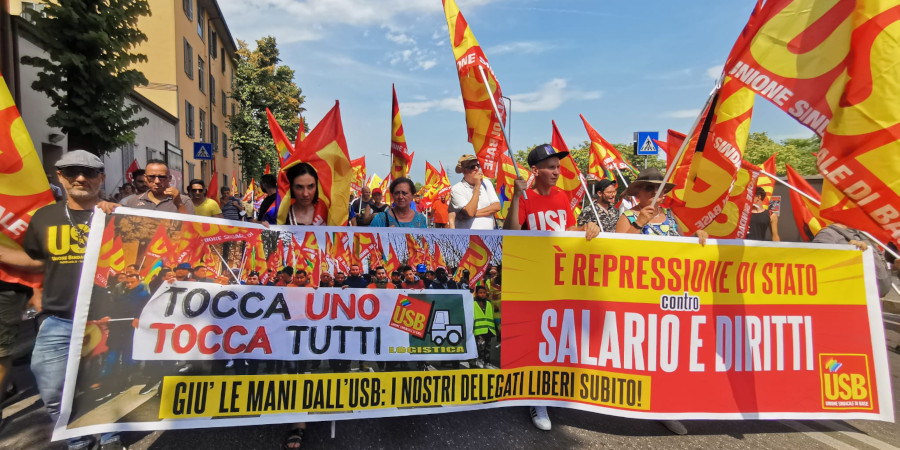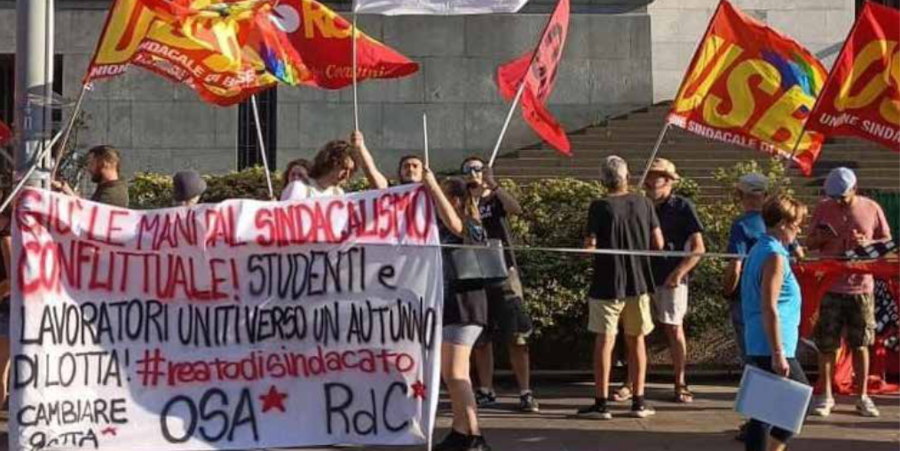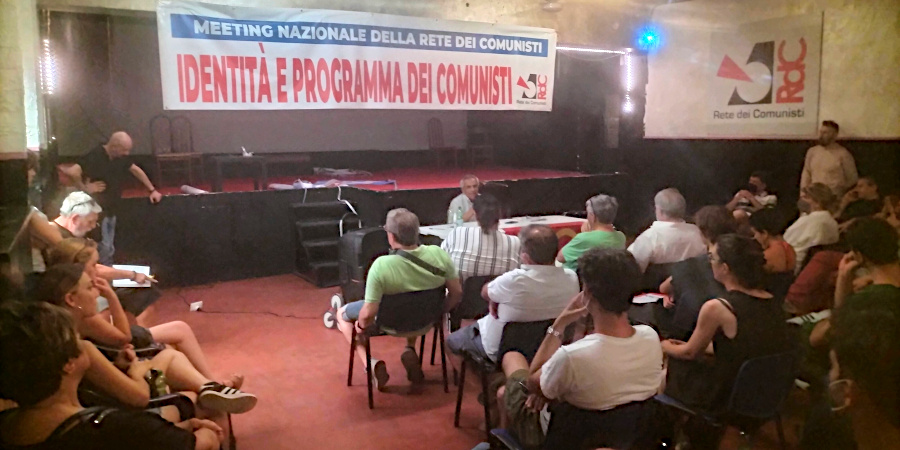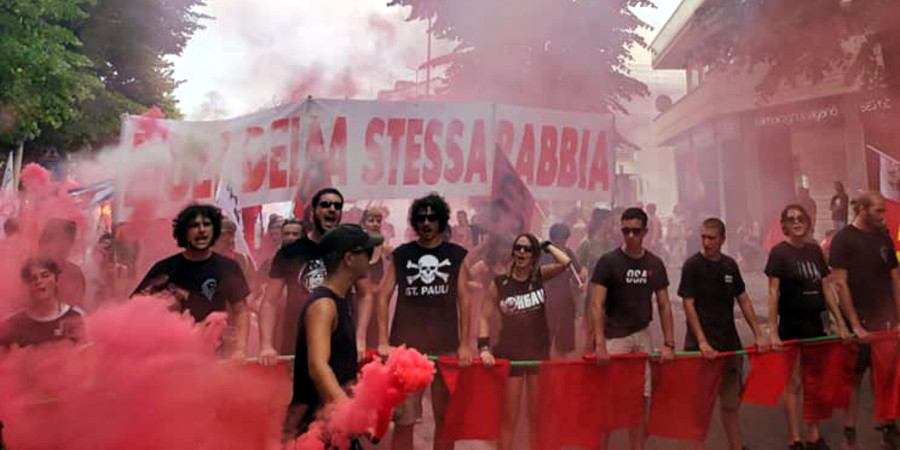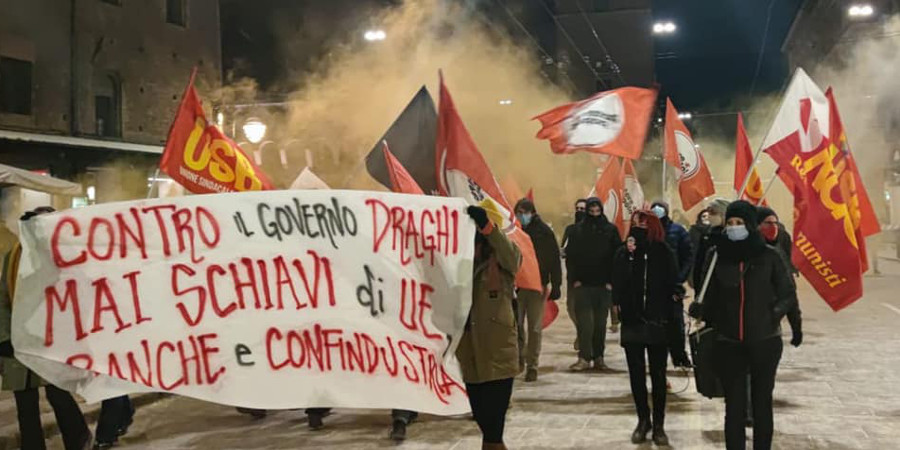| english | español | français | italiano |
Giacomo Marchetti – Rete dei Comunisti
The order of home detention by the GIP of Piacenza – the prosecution had asked for pre-trial detention in jail for all of them – for 4 leaders of SiCobas and 2 of the Unione Sindacale di Base, plus less afflictive measures for personal freedom, such as a prohibition to stay and a requirement to sign for two other trade unionists, is a very heavy attack not only on individual comrades and the two acronyms of conflictual trade unionism in question, but on the possibility of trade union organization per se and not only in the logistics sector.
The 350 pages with which the measures are “justified” and the charges – two “criminal associations” and 150 specific criminal acts – are made explicit, are the result of investigations that began in 2016, conducted by both the DIGOS and the Mobile Squad of the Emilian town, hearing numerous witnesses, constantly following the various disputes, with copious use of wiretaps.
Private violence, sabotage, resistance, interruption of a public service and, of course, criminal conspiracy “as leaders, promoters and participants, organizers,” are the charges some of which-excluding these 8 for which the request for imprisonment had been made-affected dozens of suspects.
Sabotage, i.e., blocking a conveyor belt; disruption of public service, i.e., blocking goods in companies dealing with the postal system: Resistance when charged at a picket line are some of the crimes charged, and so on.
This is in fact an immense mass filing exerted on union activity over the past 7 years in the logistics sector, in the hubs of multinational companies in the sector.
A trade union activity that has allowed not only the concrete improvement of workers’ working conditions, but the emergence of the fraudulent system of “contract changes” and its co-management together with “false cooperatives,” complicit unions and servile politics, as if Piacenza was now a company town in the hands of the logistics giants.
One must perhaps go back to Valletta’s FIAT, and then Agnelli’s, and the investigations that made a “scandal” then to be able to attempt a comparison of how one company, in this case multiple companies, so heavily directed a monstrous investigative activity because it saw its own interests being harmed.
Making the best of things without having to go up against any organized entity except one’s direct competitors is the ideal world of lorsignori who consider it “normal” to receive any benefit from the territories and yet pay taxes where it suits them best (there is no shortage of tax havens even in the European Union).
In short, this is a “judicial theorem” that feeds on some rather suggestive narratives, born out of an obvious semantic twist between “aggressor and aggressed,” which would like on the one hand to put a “tombstone” on the possibility of organizing on that weak link for the value chain where workers’ action has proven to be more incisive, growing a more advanced propensity for struggle than in other sectors, and on the other hand prepare the ground for a further narrowing of the right to strike, so as to make it “criminally actionable.”
For prosecutors and the GIP, it is the multinationals in the value chain who are the “injured party,” along with individual union members, at least until they become union leaders.
The class struggle to obtain better working conditions-even in the case of contract changes-better becomes extortion, and the strike a blackmail against the company.
Incentivizing union membership, the attempt to win greater representativeness inside the company and the dialectic between different trade unions – sometimes a bit rough – becomes a kind of “clash of criminal organizations” with practices bordering on gangsterism…
“Exasperated” employers, in order to secure social peace, have had to “give in to union demands,” and since the power relations with the growth of collective organizing have at least relativized the Far-West in which the industry was previously able to thrive, someone thought that “there was a need to give a signal,” in anticipation of an autumn that promises to be much hotter than this scorching summer.
The undercurrent message that they want to get across is that union militants, especially the confrontational ones, and the organizations they lead, are basically for-profit organizations that cut companies and individual members, not unlike – except for the total absence of corporate backlash – those pachydermic concerted union apparatuses where corruption to the detriment of members and servility to business and the palaces of power (Draghi in the lead, lately) thrives.
Of “instrumentalization of unwitting workers” the GIP speaks several times, as if it were an amorphous mass of gullible people gulled by unscrupulous union leaders, and not of workers who decide to undertake forms of hard struggles because the only incisive ones in an industry where working conditions were abysmal and respect for contracts a chimera, risking their own safety – indeed their lives, as seen in the cases of Abd Elsalam and Adil Belakhdim – spurred on by similar struggles whose results they wanted to emulate.
There is a certain skewed imagery in the narrative being peddled (and the employers’ media are there to megaphone it) in the justifications on the side of this very serious act against the “new labor movement.”
A “literary inspiration” that seems to draw from the Criminal Union Laws of the second decade in the twentieth century in the United States during the Red Scare, or even from the well-known “judicial theorems” promoted by a part of the judiciary, time and again, in our unfortunate country.
In the face of all this, the strikes proclaimed in the logistics sector since midnight on July 19 – and the spontaneous ones already put in place on the same day – the local initiatives and the national demonstration this Saturday afternoon in Piacenza are a first response to make this inquiry turn into a textbook case of the heterogenesis of the ends of class struggle from above, and into the anticipation of a new cycle of struggles.
